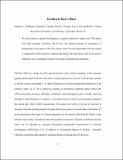Terahertz Kerr effect
Author(s)
Hoffmann, Matthias C.; Brandt, Nathaniel Curran; Hwang, Harold Young; Yeh, Ka-Lo; Nelson, Keith Adam
DownloadNelson_Terahertz Kerr.pdf (793.6Kb)
OPEN_ACCESS_POLICY
Open Access Policy
Creative Commons Attribution-Noncommercial-Share Alike
Terms of use
Metadata
Show full item recordAbstract
We have observed optical birefringence in liquids induced by single-cycle terahertz pulses with field strengths exceeding 100 kV/cm. The induced change in polarization is proportional to the square of the terahertz electric field. The time-dependent terahertz Kerr signal is composed of a fast electronic response that follows the individual cycles of the electric field and a slow exponential response associated with molecular orientation.
Date issued
2009-12Department
Massachusetts Institute of Technology. Department of ChemistryJournal
Applied Physics Letters
Publisher
American Institute of Physics
Citation
Hoffmann, Matthias C., Nathaniel C. Brandt, Harold Y. Hwang, Ka-Lo Yeh, and Keith A. Nelson. “Terahertz Kerr effect.” Applied Physics Letters 95, no. 23 (2009): 231105.
Version: Original manuscript
ISSN
00036951
1077-3118